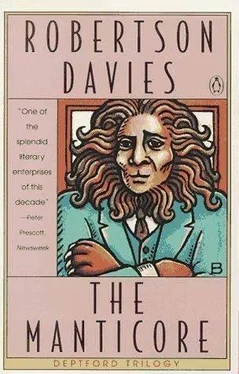Robertson Davies - The Manticore
Здесь есть возможность читать онлайн «Robertson Davies - The Manticore» весь текст электронной книги совершенно бесплатно (целиком полную версию без сокращений). В некоторых случаях можно слушать аудио, скачать через торрент в формате fb2 и присутствует краткое содержание. Жанр: Триллер, на английском языке. Описание произведения, (предисловие) а так же отзывы посетителей доступны на портале библиотеки ЛибКат.
- Название:The Manticore
- Автор:
- Жанр:
- Год:неизвестен
- ISBN:нет данных
- Рейтинг книги:3 / 5. Голосов: 1
-
Избранное:Добавить в избранное
- Отзывы:
-
Ваша оценка:
- 60
- 1
- 2
- 3
- 4
- 5
The Manticore: краткое содержание, описание и аннотация
Предлагаем к чтению аннотацию, описание, краткое содержание или предисловие (зависит от того, что написал сам автор книги «The Manticore»). Если вы не нашли необходимую информацию о книге — напишите в комментариях, мы постараемся отыскать её.
The Manticore — читать онлайн бесплатно полную книгу (весь текст) целиком
Ниже представлен текст книги, разбитый по страницам. Система сохранения места последней прочитанной страницы, позволяет с удобством читать онлайн бесплатно книгу «The Manticore», без необходимости каждый раз заново искать на чём Вы остановились. Поставьте закладку, и сможете в любой момент перейти на страницу, на которой закончили чтение.
Интервал:
Закладка:
And that was the Christmas of the Abdication for us.
After that, home was never really a secure place. Mother was not the same, and we supposed it was because of whatever happened on Christmas night. The vitality of the twenties girl never returned, and her looks changed. I shall never say that she was anything but beautiful, but she had always seemed to have even more energy than her children, which is one of the great fascinations in adults, and after that terrible night she had it no longer, and Netty kept telling us not to tire her.
I see now that this milestone in our family history meant a great advance in power for Netty, because she was the only person who knew what had happened. She had a secret, and a secret is an invaluable adjunct of power.
Her power was not exercised for her own direct advantage. I am sure that all of Netty's world and range of ambition was confined to what went on in our house. Later, when I was studying history, I saw a great deal of the feudal age in terms of Netty. She was loyal to the household and never betrayed it to any outside power. But within the household she was not to be thought of as a paid servant who could be discharged with two weeks' notice, nor do I think it ever crossed her mind that she was free to leave on the same terms. She was somebody. She was Netty. And because of who she was and what she felt, she was free to express opinions and take independent lines that lay far outside the compass of a servant in the ordinary sense. My father once told me that in all the years of their association Netty never asked him for a raise in pay; she assumed that he would give her what was fair and that in emergency she could call upon him with complete certainty of her right to do so. I recall years later some friend of Caroline's questioning the strange relationship between Don Giovanni and Leporello in the opera; if Leporello didn't like the way the Don lived, why didn't he leave him? "Because he was a Netty," said Caroline, and although the friend, who was very much of this age, didn't understand, it seemed to me to be an entirely satisfactory answer. "Though he slay me, yet will I trust in him," expressed half of Netty's attitude toward the Staunton family; the remainder was to be found in the rest of that verse – "but I will maintain mine own ways before him." Netty knew about Deptford; she knew about the people down by the crick; she knew what happened on Abdication Christmas. But it was not for lesser folk to know these things.
Did all of this make Netty dear to us? No, it made her a holy terror. People who prate about loyal old servants rarely know the hard-won coin of the spirit in which their real wages are paid. Netty's terrible silences about things that were foremost in our minds oppressed Caroline and me and were a great part of what seemed to us to be the darkness that was falling over our home.
DR. VON HALLER: Did you never ask Netty what happened on Christmas night?
MYSELF: I cannot recall whether I did, but Caroline asked the next day and got Netty's maddening answer, "Ask no questions and you'll be told no lies." When Caroline insisted, "But I want to know," there came another predictable answer, "Then Want will have to be your master."
DR. VON HALLER: And you never asked your mother?
MYSELF: How could we? You know how it is with children; they know there are forbidden areas, charged with intense feeling. They don't know that most of them are concerned with sex, but they suspect something in the world that would open up terrifying things and threaten their ideas about their parents; half of them wants to know, and half dreads to know.
DR. VON HALLER: Did you know nothing of sex, then?
MYSELF: Odds and ends. There was Netty's insistence about washing "under there", which conveyed something special. And in Grandfather Staunton's office I had found a curious Students' aid called Philips' Popular Manikin, which was a cardboard man who opened up to show his insides, and who had very discreet privy parts like my own. There was also a Popular Manikin (Female) who was partly flayed so that her breasts could only be guessed at, but who had a kind of imperforate bald triangle where the gentleman had ornaments. From some neat spy-work when Caroline was being dressed I knew that Philips had not told the whole story, and as soon as I went to school I was deluged with fanciful and disgusting information, none of which threw much light on anything and which I never dreamed of associating with my mother. I don't think I was as curious about sex as most boys. I wanted to keep things – meaning the state of my own knowledge – pretty much as it was. I suppose I had an intuition that more knowledge would mean greater complications.
DR. VON HALLER: Were you happy at school?
It was a good school, and on the whole I liked it there. Happiness was not associated with it because my real life was with my home and family. I was not bad at lessons and managed well enough at games not to be in trouble, though I never excelled. Until I was twelve I went to the preparatory part of the school by the day, but when I was twelve Father decided I should be a boarder and come home only at weekends. That was in 1940, and the war was getting into its stride, and he had to be away a great deal and thought I ought to have masculine influences in my life that Netty certainly could not have provided and my fading mother didn't know about.
Father became very important during the war because one of our jobs in Canada was to provide as much food as we could for Britain. Getting it there was a Navy job, but providing as much as possible of the right things was a big task of organization and expert management, and that was Father's great line. Quite soon he was asked to take on the Ministry of Food, and after warm assurances from the hated Prime Minister that he could have things his own way, Father decided that Mr. King had great executive abilities and that anyhow personal differences had to be set aside in an emergency. So he was away for months at a time, in Ottawa and often abroad, and home became a very feminine place.
I see now that one of the effects of this was to make Dunstan Ramsay a much bigger figure in my life. He was the chief history master at my school, Colborne College, and because he was a bachelor and lived a queer kind of inward life, he was one of the masters who was resident in the school and supervised the boarders. Indeed he was Acting Headmaster for most of the war years, because the real Headmaster had gone into the Army Education Service. But he still taught a good many classes, and he always taught history to the boys who were fresh from the Prep, because he wanted them to get a good grounding in what history was; he caught up with them afterward when they were in the top classes and gave them a final polishing and pushed them for university scholarships. So I saw Ramsay nearly every day.
Like so many good schoolmasters, he was an oddity, and the boys liked him and dreaded him and jeered at him. His nickname was Old Buggerlugs, because he had a trick of jabbing his little finger into his ear and rooting with it, as if he were scratching his brain. The other masters called him Corky because of his artificial leg, and they thought we did so too, but it was Buggerlugs when the boys were by themselves.
The bee in his bonnet was that history and myth are two aspects of a kind of grand pattern in human destiny: history is the mass of observable or recorded fact, but myth is the abstract or essence of it. He used to dredge up extraordinary myths that none of us had ever heard of and demonstrate – in a fascinating way, I must admit – how they contained some truth that was applicable to widely divergent historical situations.
He had another bee, too, and it was this one that made him a somewhat suspect figure to a lot of parents and consequently to their sons – for the school always had a substantial anti-Ramsay party among the boys. This was his interest in saints. The study of history, he said, was in part a study of the myths and legends that mankind has woven around extraordinary figures like Alexander the Great or Julius Caesar or Charlemagne or Napoleon; they were mortal men, and when the fact could be checked against the legend it was wonderful to see what hero-worshippers had attributed to them. He used to show us a popular nineteenth-century picture of Napoleon during the retreat from Moscow, slumped tragically in his sleigh, defeat and a sense of romantic doom written on his face and on those of the officers about him: then he would read us Stendhal's account of the retreat, recording how chirpy Napoleon was and how he would look out of the windows of his travelling carriage – no open sleigh for him, you can bet – saying, "Wouldn't those people be amazed if they knew who was so near to them!" Napoleon was one of Ramsay's star turns. He would show us the famous picture of Napoleon on Elba, in full uniform, sitting on a rock and brooding on past greatness. Then he would read us reports of daily life on Elba, when the chief concern was the condition of the great exile's pylorus, and the best possible news was a bulletin posted by his doctors, saying, "This morning, at 11.22 a.m., the Emperor passed a well-formed stool."
Читать дальшеИнтервал:
Закладка:
Похожие книги на «The Manticore»
Представляем Вашему вниманию похожие книги на «The Manticore» списком для выбора. Мы отобрали схожую по названию и смыслу литературу в надежде предоставить читателям больше вариантов отыскать новые, интересные, ещё непрочитанные произведения.
Обсуждение, отзывы о книге «The Manticore» и просто собственные мнения читателей. Оставьте ваши комментарии, напишите, что Вы думаете о произведении, его смысле или главных героях. Укажите что конкретно понравилось, а что нет, и почему Вы так считаете.












